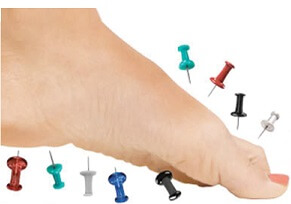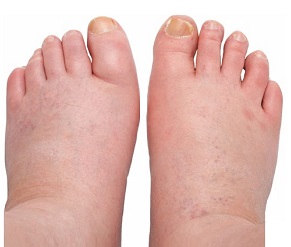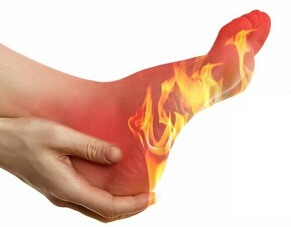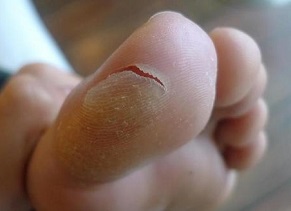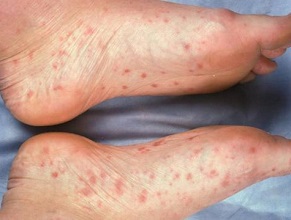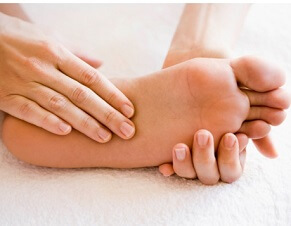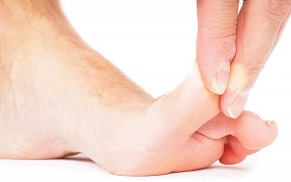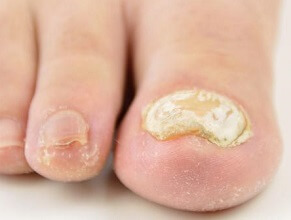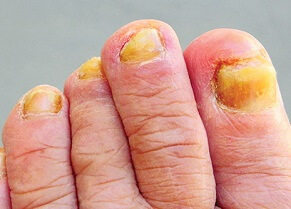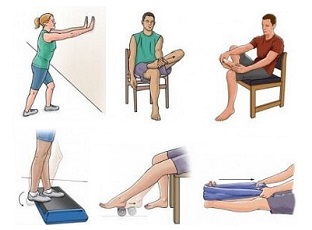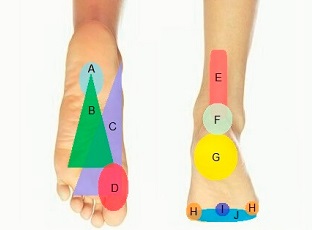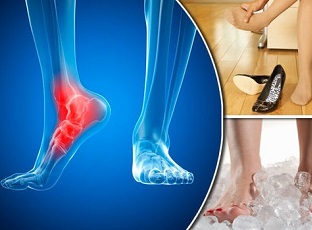- Home
- Foot Pain Symptoms
Foot Pain Symptoms
Written By: Chloe Wilson BSc(Hons) Physiotherapy
Reviewed By: FPE Medical Review Board
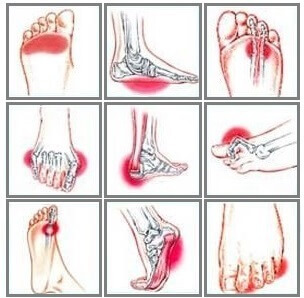
Foot pain symptoms include anything from burning pain to swelling, instability to foot rashes.
It might be the top of the foot that's affected, the toes, the foot arch or even the calf.
By thinking about your foot pain symptoms, you can work out what is wrong and how best to treat it.
Foot symptoms may be an indication of a problem in the foot itself, a medical condition or a problem further up in the leg or in the lower back.
Common Foot Pain Symptoms
There are lots of common foot pain symptoms that go alongside foot problems as well as just pain. Here we look at a whole variety foot pain symptoms, what causes them, what they mean and how common they are. Then we'll look at the best ways to treat them.
1. Altered Sensation
Changes to the normal sensation in part or all of one or both feet are very common foot pain symptoms. There may be tingling, pins and needles, numbness, hot/cold, hypersensitivity.
In most cases, altered sensation in the feet is due to nerve damage from an injury, wear and tear, abnormal growth, medical condition.
You can find out all about the different causes of altered foot sensation and how to treat them in the nerve foot pain symptoms section.
2. Swollen Feet & Ankles
One of the most common foot pain symptoms is swelling in the feet and ankles. There are many things that can cause a build-up of fluid in one or both feet resulting in swelling which may be localized or widespread.
The most common causes of foot swelling are injuries e.g ankle sprains, inflammation medical conditions e.g. gout, infections, heart problems and pregnancy
Swelling will present differently depending on the cause - there may be sudden or gradual swelling, the amount may fluctuate and pressure on foot may or may not leave an indentation.
Find out all about the different causes of foot and ankle swelling and how to treat and prevent swelling in the Foot & Ankle Swelling section.
3. Foot Pain When Walking
Another common symptoms with foot problems is foot pain when walking. A great deal of force and pressure goes through our feet when we walk and things like altered foot biomechanics, the shoes we wear and muscle imbalance can cause real problems.
There might be pain as soon as you start walking which settles once you get going, or the pain may get worse and worse the longer you are on your feet.
Find out all about the different causes and how best to treat them in the Foot Pain When Walking section.
4. Burning Foot Pain
One of the more alarming foot pain symptoms is burning sensations in the foot, ankle and calf. usually indicate a nerve problem anywhere from lower back to the foot.
Burning foot pain may indicate nerve compression, reduced blood supply, inflammation or medical condition such as diabetes.
Burning pain in one or both feet may also be accompanied by tingling, numbness or weakness, depending on the underlying cause.
You can find out all about the common causes and treatment options in the Burning Foot Pain symptoms section.
5. Calf & Foot Cramps
Foot or calf cramps can be particularly unpleasant foot pain symptoms with strong, involuntary muscle spasms in the calf, toes or feet.
Cramp may be caused by another of things such as chemical or hormonal imbalance, fatigue, medical conditions or reduced circulation.
Foot cramps vary in severity, intensity and frequency from uncontrollable muscle tightening with sharp, intense pain to occasional twinges.
You can find out all about the common causes, treatment options and how to avoid cramp in the Foot & Calf Cramps section.
6. Running Foot Pain
If you are a keen runner, chances are you have developed foot pain symptoms at some point either during or after runs.
Runners may get foot and ankle pain during or after a run. There may be pain, weakness, instability or swelling which tend to get worse with increased activity.
Foot pain in runners is often the result of over-training, previous injuries, flat feet, muscle imbalance or poor footwear. Foot pain symptoms often get progressively worse in runners if not treated promptly.
Find out the best ways to treat and prevent the different causes running foot pain symptoms in the Foot Pain When Running section.
7. Morning Foot Pain
Foot pain in the morning when you first get up is one of the common foot pain symptoms and may affect any part of your foot. Those first few steps can be absolute agony, but luckily, in most cases, the pain eases off fairly quickly.
A combination of prolonged inactivity, reduced blood flow, increased tissue inflammation, muscle and joint stiffness, wearing the wrong shoes and altered biomechanics can lead to problems like plantar fasciitis and tendonitis.
You can find out all about the common causes and foot pain symptoms in the Foot Pain In The Morning article.
8. Blisters
Blisters are another common foot pain symptoms. Blisters are fluid-filled pockets that develop in the upper layers of the skin, typically from friction, tight footwear, infection, burns, chemical exposure or medical conditions.
Blisters vary depending on the cause and there may be painful bubble-like pockets filled with clear fluid, pus or blood, vary in size and number
Find out all about the different types and causes of blisters and how to treat and avoid them in the Foot Blisters section.
9. Foot Rashes
Foot rashes can cover a small or large area, affect one or both feet or spread up the leg and can be really unpleasant foot pain symptoms.
Foot rashes usually develop in response to allergic reactions, irritation or viral, bacterial or fungal infections.
Common foot rash symptoms include red or white rash, blisters, dryness, inflammation and scaly patches depending on the underlying cause, and may or may not be itchy & painful.
You can find out about the common causes of foot rashes and how to treat and prevent them in the Foot & Ankle Rashes section.
10. Numbness In The Foot
Another common foot pain symptom is numbness in the foot where there is reduced sensation in part or all of the foot e.g. you can't feel your foot touching the ground when standing or can't detect hot or cold sensations.
Foot numbness tends to occur when the sensory signals travelling along the leg nerves get blocked between the foot and the brain, reducing sensation in foot/feet
Numbness in the foot is usually caused by reduced blood supply, pressure on a nerve or certain medical conditions e.g. MS.
You can find out about the common foot pain symptoms associated with numbness and how to treat them in the Numb Feet section.
11. Sharp Pain In Big Toe
When of the less common, but still unpleasant foot pain symptoms is a sharp stabbing pain in, on top of or under the big toe when sitting, walking or running.
Sharp pain in the big toe usually develops due to overuse, hyperextension injuries, excessive sprinting, tight footwear or from gout. Sharp pain in and around big toe is often accompanied by inflammation and redness.
You can find out all about the common causes and how to treat them in the Sharp Pain In Big Toe diagnosis section.
12. Foot Lumps & Bumps
Lumps and bumps are common foot pain symptoms. There may be a hard lump on top of the foot, and soft squashy lump on the side of the foot or there might be a bump on the bottom of the foot.
The location, size and feel of a foot lumps can help you work out what is causing the problem. In the Lump On Foot section you can find out all about the common causes, symptoms, diagnosis and treatment options for foot lumps and bump.
13. Itchy Feet
Itchy feet are another common foot symptom that can be caused by a range of things, from fungal infections to nerve damage.
There may be associated redness or a rash and the skin on the foot is often dry and cracked. But in some cases itching may be the only foot symptoms. Find out all about the common causes and how to treat them in the Itchy Feet section.
14. Red Feet
Foot pain symptoms often involve colour changes, and the most common is these is red feet. There may be an infection, inflammation, allergic reaction, foot injury or vascular problem.
Find out answers to the most frequently asked questions about Why Are My Feet Red?
15. Thickened Toenails
A common cause of foot pain symptoms in the elderly is thickening of the toenails. As we age, toenails may gradually thicken, harden, become more brittle and prone to breakage and may discolour. This typically starts at the edges of the nail and spreads inwards.
Thickened toe nails normally develop in response to fungal infections, psoriasis, bacterial infection, aging or foot injuries. Whilst they don't usually cause any major problems, thick toenails can be unpleasant, particularly if they get infected.
Find out all about the common causes and treatment options in the Thick Toenails section.
16. Yellow Toenails
One of the rare foot pain symptoms is yellow toenails. Gradual yellowy discolouration of the toenails often spreads from the edge inwards in response to fungal infection, staining or medical conditions
When toenails start to turn yellow, they may also become thick & brittle and there may be some discomfort with any pressure over the nail e.g. from tight footwear.
There are lots of things you can do for yellow toenails and you can find out all about the common causes and treatment options in the Yellow Toenails section.
Foot Pain By Location
Another way to work out what is wrong when looking at foot pain symptoms is to think about where the main pain is located:
- Pain On Top Of Foot
- Ball Of Foot Pain
- Foot Arch Pain
- Pain On The Side Of The Foot
- Calf Pain
- Toe Pain
- Heel Pain
Many foot problems will have multiple symptoms so it can be hard to work out what is going on. So if you want help working out what is causing your foot pain, pick the area where most of your pain originates from.
If you are still not sure what the underlying cause of your foot pain symptoms is, visit the foot pain diagnosis section where we will help you work out what is going on.
How Common Are Foot Symptoms?
Foot pain symptoms are a common problem with around 1 in 5 people suffering from foot pain at some point in their lives.
Ill-fitting footwear is often to blame but there are a number of serious medical conditions that affect the foot, so you should always get any foot pain symptoms checked out by your doctor.
Some foot pain symptoms are more common than others:
Very Common: Blisters, Cramp, Running Foot Pain, Swelling, Foot Lumps, Foot Pain When Walking, Itchy Feet
Common: Altered Sensation, Burning Foot Pain, Sharp Pain Big Toe, Thickened Toenails, Toe Lumps, Red Feet
Rare: Foot Rash, Numbness, Yellow Toenails
Treating Foot Pain Symptoms
The best treatment for foot pain symptoms will vary according to the underlying cause of the problem. If it's a simple case of your shoes being too tight or not fitting properly, then there's an obvious easy fix!
However, if there is an underlying medication condition or an infection, you may need to take medication to settle down your foot pain symptoms.
There are loads of different treatment options out there - visit the foot pain treatment section to find out more about how to beat your foot pain symptoms. Alternatively you can find out all about how to treat the different foot problems we have mentioned here by using the links above.
You may also be interested in the following articles:
Related Articles
Page Last Updated: 22nd January, 2025
Next Review Due: 22nd January, 2027
